Blog
Gout Pain Can Be Managed
Nerve Conditions Affecting the Feet
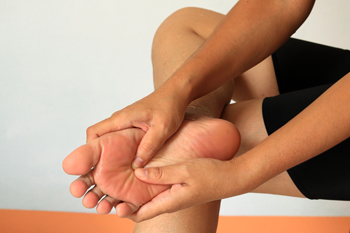
The nerves of the ankles and feet can become compromised, producing a burning sensation or numbness. These symptoms can be the result of an injury, wrap, or cast. Often nerve damage occurs during or after surgery, if the nerve is cut during the process. The medical term for these types of nerve damage is a neuroma. The tibial, saphenous, and plantar nerves affect the inside of the ankle and arch. The superficial peroneal and deep peroneal nerves affect the top of the foot. The sural nerve runs along the outside of the ankle and heel. Most people with a neuroma in these areas experience an overall burning sensation or numbing. In addition, when a nerve is damaged it can also affect other nerves that are nearby, resulting in redness and a shiny appearance. A podiatrist can perform a number of tests to determine the location of the nerve damage. Included are X-rays, MRIs, nerve conduction study, and diagnostic injection. If you have been experiencing the symptoms of a neuroma in the ankle or foot, please consult a podiatrist for a diagnosis and treatment options.
Neuropathy
Neuropathy can be a potentially serious condition, especially if it is left undiagnosed. If you have any concerns that you may be experiencing nerve loss in your feet, consult with one of our podiatrists from The Podiatry Center, PC. Our doctors will assess your condition and provide you with quality foot and ankle treatment for neuropathy.
What Is Neuropathy?
Neuropathy is a condition that leads to damage to the nerves in the body. Peripheral neuropathy, or neuropathy that affects your peripheral nervous system, usually occurs in the feet. Neuropathy can be triggered by a number of different causes. Such causes include diabetes, infections, cancers, disorders, and toxic substances.
Symptoms of Neuropathy Include:
- Numbness
- Sensation loss
- Prickling and tingling sensations
- Throbbing, freezing, burning pains
- Muscle weakness
Those with diabetes are at serious risk due to being unable to feel an ulcer on their feet. Diabetics usually also suffer from poor blood circulation. This can lead to the wound not healing, infections occurring, and the limb may have to be amputated.
Treatment
To treat neuropathy in the foot, podiatrists will first diagnose the cause of the neuropathy. Figuring out the underlying cause of the neuropathy will allow the podiatrist to prescribe the best treatment, whether it be caused by diabetes, toxic substance exposure, infection, etc. If the nerve has not died, then it’s possible that sensation may be able to return to the foot.
Pain medication may be issued for pain. Electrical nerve stimulation can be used to stimulate nerves. If the neuropathy is caused from pressure on the nerves, then surgery may be necessary.
If you have any questions, please feel free to contact our office located in Millburn, NJ . We offer the newest diagnostic and treatment technologies for all your foot care needs.
The Best Shoes to Wear When You Have Bunions
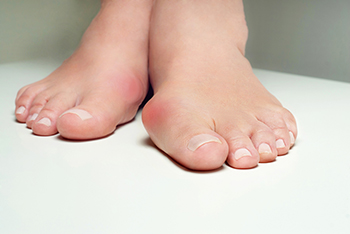
A bunion is a bony deformity at the base of the big toe. This toe may start to point inwards towards other toes and the foot bones face out. Bunions often cause pain and swelling over the big toe joint. Reasons people get bunions are unknown, but they may be due to genetics, wearing ill-fitting shoes that are too tight, a foot injury, or arthritis. Wearing high heels can also increase the chances of one developing a bunion. Anyone can develop a bunion at any time in their life but the incidence of getting one rises by more than one-third after age 65. Also, women are more likely to suffer from this condition than men. When one has a bunion, the shape of their foot can change, and trying to find shoes that can be both comfortable and stylish can be frustrating. Wearing proper footwear for bunions is imperative to prevent worsening of the condition. Some tips for finding the right shoes include looking for shoes with a wide toe so the toes can splay rather than being pushed forward, opting for leather, suede, or elasticated materials which have more give, and making sure the widest part of the shoe corresponds to the widest part of the foot. If you suffer from a bunion, contact a podiatrist who can offer treatment options as well as more advice on selecting the best shoes.
If you are suffering from bunion pain, contact one of our podiatrists of The Podiatry Center, PC. Our doctors can provide the care you need to keep you pain-free and on your feet.
What Is a Bunion?
Bunions are painful bony bumps that usually develop on the inside of the foot at the joint of the big toe. As the deformity increases over time, it may become painful to walk and wear shoes. Women are more likely to exacerbate existing bunions since they often wear tight, narrow shoes that shift their toes together. Bunion pain can be relieved by wearing wider shoes with enough room for the toes.
Causes
- Genetics – some people inherit feet that are more prone to bunion development
- Inflammatory Conditions - rheumatoid arthritis and polio may cause bunion development
Symptoms
- Redness and inflammation
- Pain and tenderness
- Callus or corns on the bump
- Restricted motion in the big toe
In order to diagnose your bunion, your podiatrist may ask about your medical history, symptoms, and general health. Your doctor might also order an x-ray to take a closer look at your feet. Nonsurgical treatment options include orthotics, padding, icing, changes in footwear, and medication. If nonsurgical treatments don’t alleviate your bunion pain, surgery may be necessary.
If you have any questions, please feel free to contact our office located in Millburn, NJ . We offer the newest diagnostic and treatment technologies for all your foot care needs.
Are Bunions Affecting Your Everyday Life?
Types of Congenital Foot Disorders
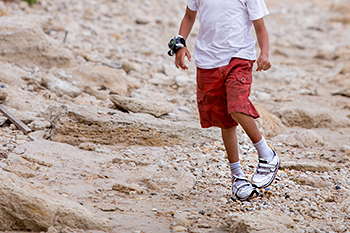
Congenital foot problems are known as birth defects, and they occur before a baby is born. Clubfoot is defined as the foot and ankle being twisted out of their normal position. There are two categories of clubfoot, consisting of positional and true. The former happens from being in an awkward position in the uterus and can be corrected after birth by immobilizing the joints. Additionally, manipulation can be performed that can help to stretch the foot and ankle. True clubfoot is an abnormally structured foot, which happens during the baby’s development. This is often corrected by performing surgery, which can be complex. Metatarsus adductus is a congenital foot condition that is noticeable as the foot turns inward, and wearing corrective shoes or splints may accelerate correction. When the bottom of the foot is turned inward, it raises the arch, and this is indicative of metatarsus varus. This generally develops as a result of unusual positioning in the womb. If you would like additional information about congenital foot disorders, please consult a podiatrist who can provide you with the information you are seeking.
Congenital foot problems require immediate attention to avoid future complications. If you have any concerns, contact one of our podiatrists of The Podiatry Center, PC. Our doctors can provide the care you need to keep you pain-free and on your feet.
Congenital foot problems are deformities affecting the feet, toes, and/or ankles that children are born with. Some of these conditions have a genetic cause while others just happen. Some specific foot ailments that children may be born with include clubfeet, polydactyly/macrodactyly, and cleft foot. There are several other foot anomalies that can occur congenitally. What all of these conditions have in common is that a child may experience difficulty walking or performing everyday activities, as well as trouble finding footwear that fits their foot deformity. Some of these conditions are more serious than others. Consulting with a podiatrist as early as possible will help in properly diagnosing a child’s foot condition while getting the necessary treatment underway.
What are Causes of Congenital Foot Problem?
A congenital foot problem is one that happens to a child at birth. These conditions can be caused by a genetic predisposition, developmental or positional abnormalities during gestation, or with no known cause.
What are Symptoms of Congenital Foot Problems?
Symptoms vary by the congenital condition. Symptoms may consist of the following:
- Clubfoot, where tendons are shortened, bones are shaped differently, and the Achilles tendon is tight, causing the foot to point in and down. It is also possible for the soles of the feet to face each other.
- Polydactyly, which usually consists of a nubbin or small lump of tissue without a bone, a toe that is partially formed but has no joints, or an extra toe.
- Vertical talus, where the talus bone forms in the wrong position causing other bones in the foot to line up improperly, the front of the foot to point up, and the bottom of the foot to stiffen, with no arch, and to curve out.
- Tarsal coalition, when there is an abnormal connection of two or more bones in the foot leading to severe, rigid flatfoot.
- Cleft foot, where there are missing toes, a V-shaped cleft, and other anatomical differences.
- Macrodactyly, when the toes are abnormally large due to overgrowth of the underlying bone or soft tissue.
Treatment and Prevention
While there is nothing one can do to prevent congenital foot problems, raising awareness and receiving neonatal screenings are important. Early detection by taking your child to a podiatrist leads to the best outcome possible.
If you have any questions please feel free to contact our office located in Millburn, NJ . We offer the newest diagnostic tools and technology to treat your foot and ankle needs.
Swollen Feet Are Common During Pregnancy
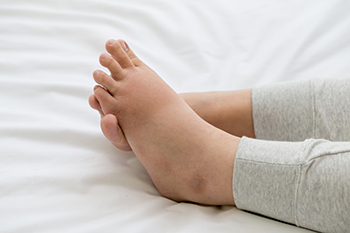
A common symptom many women suffer from during pregnancy is swollen feet. This is the result of more fluids that are needed for the growing baby and it can be uncomfortable as the pregnancy progresses. There are simple methods that can be implemented that may help to reduce swollen feet. These include drinking plenty of water daily and wearing comfortable shoes that do not constrict the feet. Reducing salt intake can make a profound difference in controlling swollen feet and research has shown blood circulation may be improved when a gentle exercise routine is practiced regularly. Many women find mild relief when their feet are elevated throughout the day and this can give the body a chance to relax. Swollen feet during pregnancy are an uncomfortable but temporary condition and if you would like more information about how to control this, please consult a podiatrist.
Pregnant women with swollen feet can be treated with a variety of different methods that are readily available. For more information about other cures for swollen feet during pregnancy, consult with one of our podiatrists from The Podiatry Center, PC. Our doctors will attend to all of your foot and ankle needs.
What Foot Problems Can Arise During Pregnancy?
One problem that can occur is overpronation, which occurs when the arch of the foot flattens and tends to roll inward. This can cause pain and discomfort in your heels while you’re walking or even just standing up, trying to support your baby.
Another problem is edema, or swelling in the extremities. This often affects the feet during pregnancy but tends to occur in the later stages.
How Can I Keep My Feet Healthy During Pregnancy?
- Wearing orthotics can provide extra support for the feet and help distribute weight evenly
- Minimize the amount of time spent walking barefoot
- Wear shoes with good arch support
- Wear shoes that allow for good circulation to the feet
- Elevate feet if you experience swelling
- Massage your feet
- Get regular, light exercise, such as walking, to promote blood circulation to the feet
If you have any questions please feel free to contact our office located in Millburn, NJ . We offer the newest diagnostic and treatment technologies for all your foot and ankle needs.
Are You Suffering From Ingrown Toenails?
Foot Bath for Seniors
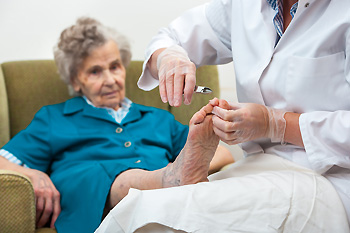
Seniors must take extra special care in maintaining healthy feet because as individuals age, they can become more susceptible to foot afflictions. One potential way in which a senior might be able to provide extra care for the health of their feet is by performing a foot bath to clean the feet. However, there are several things a senior should keep in mind. First, after performing a foot bath, it is important for the individual to completely dry their feet. A senior might need someone else to help them perform this critical step. Whoever is drying the feet should be mindful of drying in between the toes as well. Second, it is important to make sure that the temperature of the water in the foot bath is sufficient and not too hot. Making sure the temperature is not too hot might be difficult for some seniors because some might have conditions that reduce sensations in the feet. If you want to learn more about elderly foot care, contact a podiatrist today.
Proper foot care is something many older adults forget to consider. If you have any concerns about your feet and ankles, contact one of our podiatrists from The Podiatry Center, PC. Our doctors can provide the care you need to keep you pain-free and on your feet.
The Elderly and Their Feet
As we age we start to notice many changes in our body, but the elder population may not notice them right away. Medical conditions may prevent the elderly to take notice of their foot health right away. Poor vision is a lead contributor to not taking action for the elderly.
Common Conditions
- Neuropathy – can reduce feeling in the feet and can hide many life-threatening medical conditions.
- Reduced flexibility – prevents the ability of proper toenail trimming, and foot cleaning. If left untreated, it may lead to further medical issues.
- Foot sores – amongst the older population can be serious before they are discovered. Some of the problematic conditions they may face are:
- Gouging toenails affecting nearby toe
- Shoes that don’t fit properly
- Pressure sores
- Loss of circulation in legs & feet
- Edema & swelling of feet and ankles
Susceptible Infections
Diabetes and poor circulation can cause general loss of sensitivity over the years, turning a simple cut into a serious issue.
If you have any questions please feel free to contact our office located in Millburn, NJ . We offer the newest diagnostic and treatment technologies for all your foot and ankle needs.
Can Children and Teenagers Suffer With Gout?
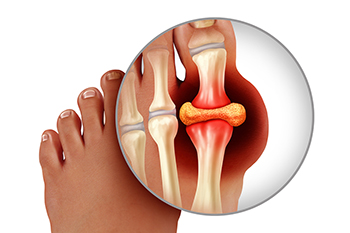
Gout is a type of inflammatory arthritis that leads to pain and swelling in and around joints. It is much more common in adults but can affect children and teens as well. Gout affecting this younger age group is referred to as pediatric gout. With gout, excess uric acid in the blood builds up in the joints and forms sharp crystals to form in joints. The joints may become painful, swollen, and stiff. This condition usually starts in the big toe. Given how rare gout is in children, it is often thought to be from an underlying medical problem. This affliction can occur at birth or be associated with obesity, down syndrome, congenital heart disease, or kidney disease among other things. Male children experience a more sudden rise in uric acid levels at around age 12 compared to similarly aged females. This may be due to rising testosterone levels in males, which gives rise to increased uric acid. In contrast, rising estrogen levels in females cause an increase in uric acid removal. Increased uric acid levels may or may not lead to gout. If your child is complaining of big toe joint pain, it is suggested that you see a podiatrist as soon as possible to see if gout is the culprit.
Gout is a foot condition that requires certain treatment and care. If you are seeking treatment, contact one of our podiatrists from The Podiatry Center, PC. Our doctors will treat your foot and ankle needs.
What Is Gout?
Gout is a type of arthritis caused by a buildup of uric acid in the bloodstream. It often develops in the foot, especially the big toe area, although it can manifest in other parts of the body as well. Gout can make walking and standing very painful and is especially common in diabetics and the obese.
People typically get gout because of a poor diet. Genetic predisposition is also a factor. The children of parents who have had gout frequently have a chance of developing it themselves.
Gout can easily be identified by redness and inflammation of the big toe and the surrounding areas of the foot. Other symptoms include extreme fatigue, joint pain, and running high fevers. Sometimes corticosteroid drugs can be prescribed to treat gout, but the best way to combat this disease is to get more exercise and eat a better diet.
If you have any questions please feel free to contact our office located in Millburn, NJ . We offer the newest diagnostic and treatment technologies for all your foot and ankle needs.
Reminder: When Was the Last Time...?
More...
Athlete’s Foot May Be a Chronic Skin Infection
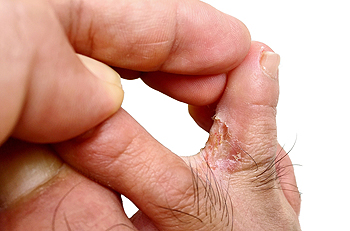
Tinea pedis, more commonly known as athlete’s foot, is considered to be a fungal skin infection. It is generally found between the toes or on the soles of the feet. The fungus enters the body through small cracks in the skin and may develop into a chronic infection. This type of fungus lives in warm and moist environments and is contagious. Some of the places where appropriate shoes are urged to be worn are public swimming pools, shower room floors, and locker rooms. There are methods that can be implemented to help prevent the spread of athlete's foot. These include keeping the toenails trimmed and airing shoes out while alternating them every other day. It is beneficial to wear shoes and socks that are made of breathable materials, which helps to keep the feet clean and dry. Athlete’s foot generally does not heal on its own, and a podiatrist is often consulted who can provide an accurate diagnosis and offer correct treatment options.
Athlete’s foot is an inconvenient condition that can be easily reduced with the proper treatment. If you have any concerns about your feet and ankles, contact one of our podiatrists from The Podiatry Center, PC. Our doctors will treat your foot and ankle needs.
Athlete’s Foot: The Sole Story
Athlete's foot, also known as tinea pedis, can be an extremely contagious foot infection. It is commonly contracted in public changing areas and bathrooms, dormitory style living quarters, around locker rooms and public swimming pools, or anywhere your feet often come into contact with other people.
Solutions to Combat Athlete’s Foot
- Hydrate your feet by using lotion
- Exfoliate
- Buff off nails
- Use of anti-fungal products
- Examine your feet and visit your doctor if any suspicious blisters or cuts develop
Athlete’s foot can cause many irritating symptoms such as dry and flaking skin, itching, and redness. Some more severe symptoms can include bleeding and cracked skin, intense itching and burning, and even pain when walking. In the worst cases, Athlete’s foot can cause blistering as well. Speak to your podiatrist for a better understanding of the different causes of Athlete’s foot, as well as help in determining which treatment options are best for you.
If you have any questions please feel free to contact our office located in Millburn, NJ . We offer the newest diagnostic and treatment technologies for all your foot and ankle needs.
Are Flat Feet Problematic?
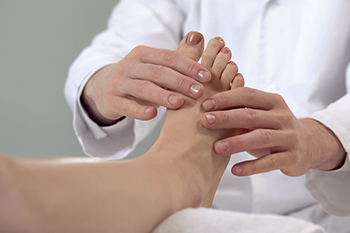
Flat feet is a condition that occurs in an individual when they do not exhibit any natural arch in their feet. This is to say that their entire foot rests completely against the floor. It is true that many cases of flat feet are not particularly problematic. For example, many cases rarely cause other complications or preclude you from engaging in physical activities. However, some cases of flat feet can cause the individual pain. If you find that you are prone to foot or ankle injuries, you are having difficulty walking, or only one foot has lost its natural arch, it might be a good idea to consult a podiatrist. This foot specialist will help you identify and address the problem with your flat feet. Don’t take any chances with the health of your feet–visit a podiatrist today.
Flatfoot is a condition many people suffer from. If you have flat feet, contact one of our podiatrists from The Podiatry Center, PC. Our doctors will treat your foot and ankle needs.
What Are Flat Feet?
Flatfoot is a condition in which the arch of the foot is depressed and the sole of the foot is almost completely in contact with the ground. About 20-30% of the population generally has flat feet because their arches never formed during growth.
Conditions & Problems:
Having flat feet makes it difficult to run or walk because of the stress placed on the ankles.
Alignment – The general alignment of your legs can be disrupted, because the ankles move inward which can cause major discomfort.
Knees – If you have complications with your knees, flat feet can be a contributor to arthritis in that area.
Symptoms
- Pain around the heel or arch area
- Trouble standing on the tip toe
- Swelling around the inside of the ankle
- Flat look to one or both feet
- Having your shoes feel uneven when worn
Treatment
If you are experiencing pain and stress on the foot you may weaken the posterior tibial tendon, which runs around the inside of the ankle.
If you have any questions please feel free to contact our office located in Millburn, NJ . We offer the newest diagnostic and treatment technologies for all your foot and ankle needs.
Why Live with Pain and Numbness in Your Feet?
Foot Structure and Bunions
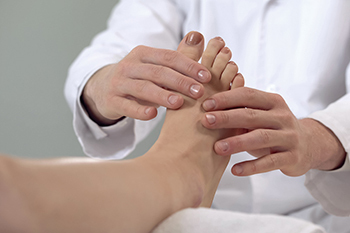
Research has indicated that the foot condition known as a bunion may be inherited. Furthermore, studies have shown the bunion itself has not developed because of genetic reasons, but the foot structure that contributed to it may be inherited. It is easy to notice the bony protrusion on the big toe’s side. Some people develop bunions if they have endured a traumatic foot injury, which may also contribute to changes in the foot structure. There may be existing medical conditions like arthritis, multiple sclerosis, or cerebral palsy that can lead to a bunion. A common reason why many patients develop bunions can be the type of shoes that are worn. High heels and shoes that do not have adequate room for the toes to move freely in may cause a bunion. This particular foot condition is considered to be a deformity, and it is suggested that you confer with a podiatrist who can guide you toward correct treatment methods.
If you are suffering from bunions, contact one of our podiatrists of The Podiatry Center, PC. Our doctors can provide the care you need to keep you pain-free and on your feet.
What Is a Bunion?
A bunion is formed of swollen tissue or an enlargement of boney growth, usually located at the base joint of the toe that connects to the foot. The swelling occurs due to the bones in the big toe shifting inward, which impacts the other toes of the foot. This causes the area around the base of the big toe to become inflamed and painful.
Why Do Bunions Form?
Genetics – Susceptibility to bunions are often hereditary
Stress on the feet – Poorly fitted and uncomfortable footwear that places stress on feet, such as heels, can worsen existing bunions
How Are Bunions Diagnosed?
Doctors often perform two tests – blood tests and x-rays – when trying to diagnose bunions, especially in the early stages of development. Blood tests help determine if the foot pain is being caused by something else, such as arthritis, while x-rays provide a clear picture of your bone structure to your doctor.
How Are Bunions Treated?
- Refrain from wearing heels or similar shoes that cause discomfort
- Select wider shoes that can provide more comfort and reduce pain
- Anti-inflammatory and pain management drugs
- Orthotics or foot inserts
- Surgery
If you have any questions, please feel free to contact our office located in Millburn, NJ . We offer the newest diagnostic and treatment technologies for all your foot care needs.





